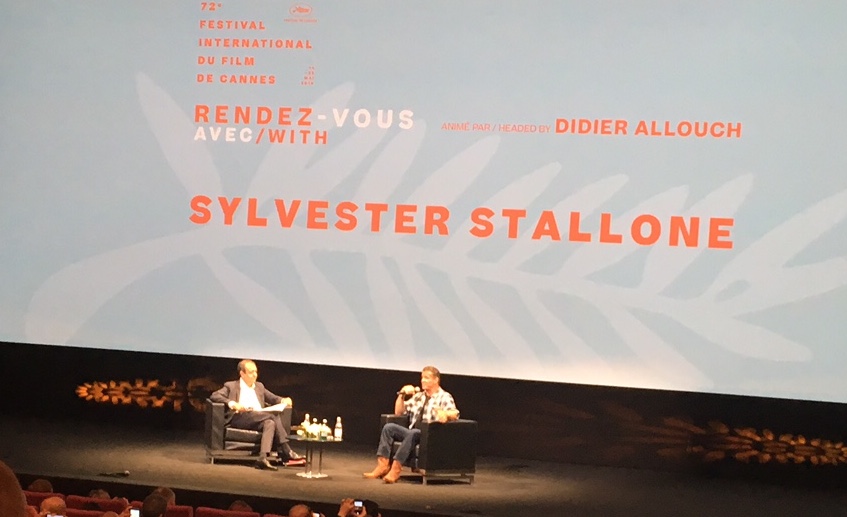Few screen legends would look more out of place at Cannes than Sylvester Stallone, and that would be true even if he didn’t show up for an onstage conversation at the Debussy theater on Friday afternoon wearing a flannel overshirt and jeans—a far cry from the black tie he’d don hours later for a red-carpet screening of “First Blood.”
Stallone was at the festival to promote “Rambo V: Last Blood”—”Rambo Cinq” in French—opening this fall. But the conversation, moderated by the journalist Didier Allouch, was mainly a look back at his career. Here are some highlights from what Stallone said.
*He remarked on his physical features and his voice, which was affected by an accident when he was born. “I knew it was bad when Arnold Schwarzenegger said, ‘You have an accent.'”
*He said he did not like to see his characters die at the ends of movies. “The last three ‘Rocky’s I wrote, he dies. Every time. But I changed it. I start out with the premise, logically, they should. Rambo should have died in the second one. But there’s just something. I go, you know, let’s just push it. Logically, he should die. Illogically, where should we take him? Is there still a story? I just don’t believe in reality all the time.”
*He discussed being conscious of the limits of his acting range. “I knew that I was kind of limited as an actor because of physical type. I think quite often, especially acting students, they think or they’re taught to be as versatile as possible—and that’s a nice theory, but that’s not real. That’s not going to happen. You have a certain thing that you can do well.…Dustin Hoffman’s not playing Rambo and I’m not playing Tootsie.…I just want to do what I do as best as I can. Every time I venture away from it, I end up in ‘Stop! Or My Mom Will Shoot.'”
*Although he got criticized for using so many montages in “Rocky IV,” he likes the montages. “I said, I’m going to make a montage movie. We sort of know what the character’s all about. I don’t have to explain who Rocky is by the fourth one, right? But I do have to show the journey. I want to show the phenomenon of what’s happening and the money and the wealth and the fear and who Dolph Lundgren is. I said, that’s montage. Critically, I got murdered, but financially, it was the most successful of the group.”
*It took time before he became aware of his Rambo character’s political significance. “I’m almost a political atheist. I hadn’t even voted before. So it had nothing to do with politics. I just thought, this is a great story, this is an interesting story about alienation. Then, I started to do research, and I realized that so many veterans were coming back and were so damaged, and there were so many suicides. I thought, maybe this can have some benefit.… If I’m going to make this movie, I have to be responsible for thousands and thousands of men that are ready to kill themselves.”
*But Rambo turned into a political talking point anyway. “It was not by any means ever supposed to be a political statement. It became one. It took on a life of its own.” Discussing how President Reagan began talking about the film, Stallone dropped a microphone in his lap—expressing exasperation.
*He believes that changing his physique has affected his performances. “If you start to change your body, and I found this out on ‘Cop Land,’ when you start to alter what is your natural size, you react differently. It literally changes your personality. You get to the point where you’re in really great shape and you become very narcissistic. You want to walk around naked. And then if you don’t, we’re in ‘Cop Land,’ you go, maybe I’ll wear a poncho. So that’s the way I approached it—not so much as vanity as this was one of the ways I would prepare.”
*The sixth Rocky movie, “Rocky Balboa,” was, to Stallone, not about boxing, but about grief. “I believe that our life is all about math, simple math. Up to about 40 years old, 45 years old, everything is wonderful. Your career is going, you’re acquiring things, you’re buying a house, you look good in clothes…and then, the second half of your life, the kids are moving out, the house is leaking, you’re losing your job, your friends are dying. So it’s about subtraction. And how do you deal with subtraction? Because that’s the hard part. And I go that’s a movie, man. That’s a movie. And Rocky can only deal with loss getting, as he says, the beast out of the basement—through literally pain. He wants to replace old pain with new pain.”
*His collaboration with Arnold Schwarzenegger on “Escape Plan” happened years later than it should have. “We should have done it earlier, but we could never sit in a room together and agree, ever. My knife is gonna be that long. Mine’s this long. … It’s the last of a breed.”












